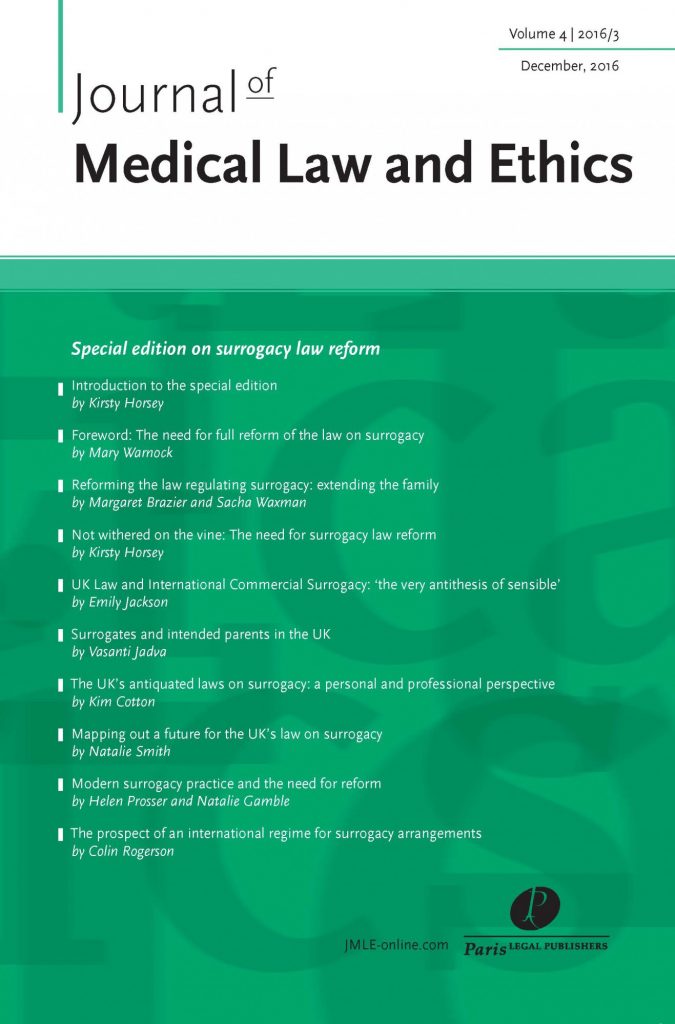Surrogacy law reform championed by Kent Law School Senior Lecturer Dr Kirsty Horsey is the focus of a newly-published special edition of the Journal of Medical Law and Ethics (JMLE) and the subject of a debate held in the House of Lords last month.
Articles in the latest volume of the JMLE (published by Paris Legal Publishers) are authored by contributors to a surrogacy law reform conference organised by Dr Horsey and held in London last year. Dr Horsey edited the collection and wrote the journal’s introduction, together with a chapter entitled ‘Not withered on the vine: The need for surrogacy law reform.’
The journal also includes a foreword by Baroness Mary Warnock, whose influential 1984 report on human fertilisation and embryology formed the basis of current surrogacy laws. Baroness Warnock told attendees at the London conference in May 2016 that she had changed her mind about the ethical problems she had previously associated with surrogacy and now agreed that reform of the law was needed. Her revised observations and recommendations are included in the journal’s foreword. In addition to contributions by academics and legal professionals working in the field, the journal also includes pieces by Kim Cotton, founder and chairperson of COTS (Childlessness Overcome Through Surrogacy), and Natalie Smith, trustee of Surrogacy UK and mother of twins born to a surrogate.
The call for surrogacy law reform was further advanced last month by Liberal Democrat Peer Baroness Elizabeth Barker who was prompted to initiate a debate in House of Lords after attending the London conference in 2016. In her statement to the House on 14 December, Baroness Barker drew upon the findings of a research report authored by Dr Horsey in collaboration with Surrogacy UK. The report, ‘Surrogacy in the UK: Myth busting and reform’, was published in November 2015 and provided an unprecedented insight into how surrogacy is practiced in the UK.
Contributors to the debate included Lord Faulks, Viscount Craigavon, Lord Berkeley of Knighton, Lord Brown of Eaton-under-Heywood, Lord Mackay of Clashfern, Baroness Walmsley and Lord Hunt of Kings Heath.
In her response on behalf of the Government, Baroness Chisholm of Owlpen acknowledged the value of surrogacy as a means of helping to create new families for people who might not otherwise be able to have their own children. With reference to Dr Horsey’s research report, she said: ‘The Government have welcomed the report’s continuing commitment to the altruistic principles of surrogacy and the important message about applying for parental orders to secure legal parenthood. It is also helpful that the report provides reassurance that the tendency towards seeking international surrogacy arrangements, although undoubtedly a concern and a challenge, is not as widespread as some have sought to portray. The Government have taken note of the changes to surrogacy legislation and policy that the report recommends.’
Dr Horsey said she hoped the support for surrogacy law reform was being seen by the Law Commission which recently closed a consultation asking whether surrogacy should be included in its next programme of reform. She said: ‘I am hopeful of a positive response from the Law Commission now that momentum seems to be building and there seems to be widespread support for legal reform of our outdated and at times unjust surrogacy laws. So many children’s and families’ best interests depend on such reform and it would now, I think, be surprising for surrogacy law to continue to be “swept under the carpet” as it has been in the past.’
Dr Horsey has published widely on issues relating to the regulation of human reproduction and has been actively researching surrogacy law – and advocating reform – for 18 years. She has written a number of articles and book chapters on surrogacy in the UK, including publications in Child and Family Law Quarterly and the Medical Law Review. Dr Horsey’s edited collection Revisiting the Regulation of Human Fertilisation and Embryology was published in July 2016 by Routledge.
In addition to her involvement with the Centre for Interdisciplinary Studies of Reproduction (CiSoR), a research centre based at the University of Kent, Dr Horsey is a member of the advisory committee for the Progress Educational Trust (PET), a charity that works to inform debate on assisted conception and genetics. She is also a Contributing Editor for BioNews, a free news and comment digest published by PET. More details of Dr Horsey’s work on surrogacy are available on the Surrogacy Law Reform Project website.

